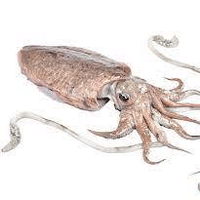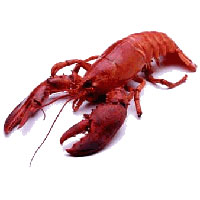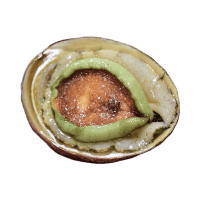Crayfish raw nutrition: calories, carbs, GI, protein, fiber, fats
Crustaceans, crayfish, mixed species, wild, raw
*all the values are displayed for the amount of 100 grams
Top nutrition facts for Crayfish raw

| Calories ⓘ Calories for selected serving | 77 kcal |
|
Glycemic index ⓘ
Source: *Explanation
Check out our Glycemic index chart page for the full list.
|
0 (low) |
| Net Carbs ⓘ Net Carbs = Total Carbohydrates – Fiber – Sugar Alcohols | 0 grams |
| Default serving size ⓘ Serving sizes are mostly taken from FDA's Reference Amounts Customarily Consumed (RACCs) | 3 oz (85 grams) |
| Acidity (Based on PRAL) ⓘ PRAL (Potential renal acid load) is calculated using a formula. On the PRAL scale the higher the positive value, the more is the acidifying effect on the body. The lower the negative value, the higher the alkalinity of the food. 0 is neutral. | 9.9 (acidic) |
| Oxalates ⓘ Animal products do not contain oxalate. | 0 mg |
Cholesterol ⓘHigher in Cholesterol content than 91% of foods
Copper ⓘHigher in Copper content than 79% of foods
Phosphorus ⓘHigher in Phosphorus content than 78% of foods
Selenium ⓘHigher in Selenium content than 70% of foods
Vitamin B12 ⓘHigher in Vitamin B12 content than 69% of foods
Crayfish raw calories (kcal)
| Calories for different serving sizes of crayfish raw | Calories | Weight |
|---|---|---|
| Calories in 100 grams | 77 | |
| Calories in 8 crayfish | 21 | 27 g |
| Calories in 3 oz | 65 | 85 g |
Crayfish raw Glycemic index (GI)
Source:
*Explanation
Check out our Glycemic index chart page for the full list.
Mineral coverage chart
Mineral chart - relative view
Vitamin coverage chart
Vitamin A:
48µg of 900µg
5.3%
Vitamin E:
8.6mg of 15mg
57%
Vitamin D:
0µg of 20µg
0%
Vitamin C:
3.6mg of 90mg
4%
Vitamin B1:
0.21mg of 1mg
18%
Vitamin B2:
0.1mg of 1mg
7.4%
Vitamin B3:
6.6mg of 16mg
41%
Vitamin B5:
1.6mg of 5mg
33%
Vitamin B6:
0.32mg of 1mg
25%
Folate:
111µg of 400µg
28%
Vitamin B12:
6µg of 2µg
250%
Vitamin K:
0.3µg of 120µg
0.25%
Vitamin chart - relative view
Macronutrients chart
Protein:
Daily Value: 32%
16 g of 50 g
16 g (32% of DV )
Fats:
Daily Value: 1%
1 g of 65 g
1 g (1% of DV )
Carbs:
Daily Value: 0%
0 g of 300 g
0 g (0% of DV )
Water:
Daily Value: 4%
82.2 g of 2,000 g
82.2 g (4% of DV )
Other:
0.8 g
0.8 g
Protein quality breakdown
Tryptophan:
666mg of 280mg
238%
Threonine:
1932mg of 1,050mg
184%
Isoleucine:
2316mg of 1,400mg
165%
Leucine:
3795mg of 2,730mg
139%
Lysine:
4164mg of 2,100mg
198%
Methionine:
1350mg of 1,050mg
129%
Phenylalanine:
2016mg of 1,750mg
115%
Valine:
2247mg of 1,820mg
123%
Histidine:
975mg of 700mg
139%
Fat type information
Saturated fat:
0.16 g
Monounsaturated fat:
0.17 g
Polyunsaturated fat:
0.29 g
All nutrients for Crayfish raw per 100g
| Nutrient | Value | DV% | In TOP % of foods | Comparison |
| Vitamin A | 16µg | 2% | 45% | |
| Calories | 77kcal | 4% | 79% |
1.6 times more than Orange
|
| Protein | 16g | 38% | 32% |
5.7 times more than Broccoli
|
| Fats | 0.95g | 1% | 75% |
35.1 times less than Cheese
|
| Vitamin C | 1.2mg | 1% | 40% |
44.2 times less than Lemon
|
| Net carbs | 0g | N/A | 75% |
N/A
|
| Carbs | 0g | 0% | 100% |
N/A
|
| Cholesterol | 114mg | 38% | 9% |
3.3 times less than Egg
|
| Vitamin D | 0µg | 0% | 100% |
N/A
|
| Magnesium | 27mg | 6% | 37% |
5.2 times less than Almonds
|
| Calcium | 27mg | 3% | 46% |
4.6 times less than Milk
|
| Potassium | 302mg | 9% | 36% |
2.1 times more than Cucumber
|
| Iron | 0.84mg | 11% | 66% |
3.1 times less than Beef broiled
|
| Sugar | 0g | N/A | 100% |
N/A
|
| Fiber | 0g | 0% | 100% |
N/A
|
| Copper | 0.42mg | 47% | 21% |
3 times more than Shiitake
|
| Zinc | 1.3mg | 12% | 48% |
4.9 times less than Beef broiled
|
| Phosphorus | 256mg | 37% | 22% |
1.4 times more than Chicken meat
|
| Sodium | 58mg | 3% | 66% |
8.4 times less than White bread
|
| Vitamin E | 2.9mg | 19% | 38% |
2 times more than Kiwi
|
| Manganese | 0.23mg | 10% | 49% | |
| Selenium | 32µg | 57% | 30% | |
| Vitamin B1 | 0.07mg | 6% | 62% |
3.8 times less than Pea raw
|
| Vitamin B2 | 0.03mg | 2% | 86% |
4.1 times less than Avocado
|
| Vitamin B3 | 2.2mg | 14% | 56% |
4.3 times less than Turkey meat
|
| Vitamin B5 | 0.55mg | 11% | 55% |
2.1 times less than Sunflower seeds
|
| Vitamin B6 | 0.11mg | 8% | 63% |
1.1 times less than Oats
|
| Vitamin B12 | 2µg | 83% | 31% |
2.9 times more than Pork
|
| Vitamin K | 0.1µg | 0% | 88% |
1016 times less than Broccoli
|
| Folate | 37µg | 9% | 39% |
1.6 times less than Brussels sprouts
|
| Saturated fat | 0.16g | 1% | 79% |
37.1 times less than Beef broiled
|
| Choline | 81mg | 15% | 56% | |
| Monounsaturated fat | 0.17g | N/A | 79% |
56.3 times less than Avocado
|
| Polyunsaturated fat | 0.29g | N/A | 72% |
161 times less than Walnut
|
| Tryptophan | 0.22mg | 0% | 61% |
1.4 times less than Chicken meat
|
| Threonine | 0.64mg | 0% | 70% |
1.1 times less than Beef broiled
|
| Isoleucine | 0.77mg | 0% | 68% |
1.2 times less than Salmon raw
|
| Leucine | 1.3mg | 0% | 70% |
1.9 times less than Tuna Bluefin
|
| Lysine | 1.4mg | 0% | 68% |
3.1 times more than Tofu
|
| Methionine | 0.45mg | 0% | 67% |
4.7 times more than Quinoa
|
| Phenylalanine | 0.67mg | 0% | 70% |
Equal to Egg
|
| Valine | 0.75mg | 0% | 70% |
2.7 times less than Soybean raw
|
| Histidine | 0.33mg | 0% | 73% |
2.3 times less than Turkey meat
|
| Caffeine | 0mg | 0% | 100% | |
| Omega-3 - EPA | 0.1g | N/A | 34% |
6.6 times less than Salmon
|
| Omega-3 - DHA | 0.04g | N/A | 37% |
38.4 times less than Salmon
|
| Omega-3 - DPA | 0.01g | N/A | 44% |
17 times less than Salmon
|
Check out similar food or compare with current
NUTRITION FACTS LABEL
Nutrition Facts
___servings per container
Serving Size ______________
Serving Size ______________
Amount Per 100g
Calories 77
% Daily Value*
1.5%
Total Fat
0.95g
0.72%
Saturated Fat 0.16g
0
Trans Fat
0g
38%
Cholesterol 114mg
2.5%
Sodium 58mg
0
Total Carbohydrate
0g
0
Dietary Fiber
0g
Total Sugars 0g
Includes ? g Added Sugars
Protein
16g
Vitamin D
0mcg
0
Calcium
27mg
2.7%
Iron
0.84mg
11%
Potassium
302mg
8.9%
*
The % Daily Value (DV) tells you how much a nutrient in a serving of food contributes to a daily diet. 2,000 calories a day is used for general nutrition advice.
Health checks
ⓘ
Dietary cholesterol is not associated with an increased risk of coronary heart disease in healthy individuals. However, dietary cholesterol is common in foods that are high in harmful saturated fats.
Source
Low in Cholesterol
ⓘ
Trans fat consumption increases the risk of cardiovascular disease and mortality by negatively affecting blood lipid levels.
Source
No Trans Fats
ⓘ
Saturated fat intake can raise total cholesterol and LDL (low-density lipoprotein) levels, leading to an increased risk of atherosclerosis. Dietary guidelines recommend limiting saturated fats to under 10% of calories a day.
Source
Low in Saturated Fats
ⓘ
While the consumption of moderate amounts of added sugars is not detrimental to health, an excessive intake can increase the risk of obesity, and therefore, diabetes.
Source
Low in Sugars
References
All the values for which the sources are not specified explicitly are taken from FDA’s Food Central. The exact link to the food presented on this page can be found below.


